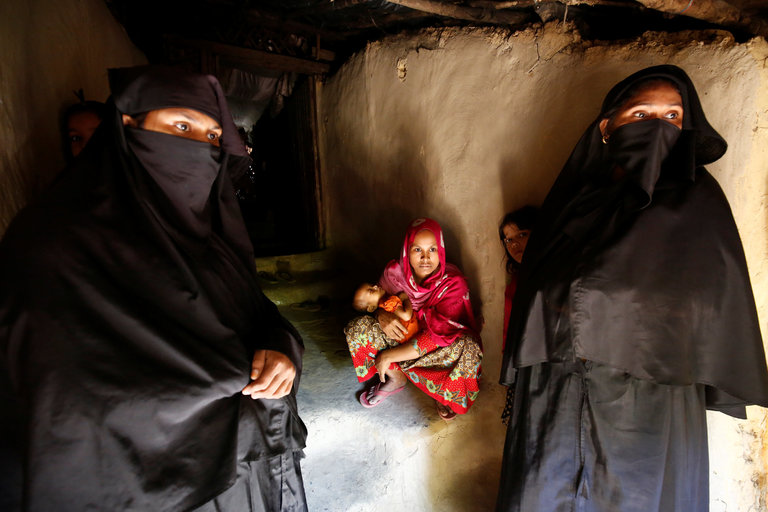Myanmar’s Shameful Denial
ASIA--PACIFIC, 16 Jan 2017
The New York Times | Editorial – TRANSCEND Media Service

Rohingya women near a refugee camp in Cox’s Bazar, Bangladesh, in November.
Credit Mohammad Ponir Hossain/Reuters
10 Jan 2017 – Last month, President Obama lifted sanctions against Myanmar, citing “substantial progress in improving human rights” following the historic election victory of the Nobel laureate Daw Aung San Suu Kyi’s National League for Democracy party in November 2015. Tragically, that praise is proving premature.
Hopes that Ms. Aung San Suu Kyi would bring an end to the brutal repression of the Rohingya, a Muslim minority, lie dashed by a military campaign against the Rohingya in Rakhine State that began after an attack on a police station on Oct. 9. Since then, some 34,000 people have fled over the border to Bangladesh amid allegations of murder and rape by military forces, and satellite images of burned villages. At least 86 people have been killed.
Yet, a commission appointed by Ms. Aung San Suu Kyi concluded last week that “there were no cases of genocide and religious persecution in the region.” Human rights groups rightly accuse the commission of a whitewash. In an effort to muzzle reporting, Myanmar’s government has barred independent journalists from the region, and dismissed reports of abuses as “fake news” and “fake rape.”
After a disturbing video of police brutally beating Rohingya villagers in November surfaced in late December, the government said “legal action was being taken.” But, as Assistant Secretary of State Tom Malinowski observed, the video suggests such abuses are “normal and allowed.”
Meanwhile, the International Crisis Group reports a new militant Rohingya organization with ties to individuals in Saudi Arabia and Pakistan was behind an Oct. 9 attack. The group warns that failure by Myanmar to address longstanding grievances by the Rohingya and the indiscriminate military crackdown in Rakhine State risk “generating a spiral of violence.” This is the last thing Myanmar needs.
As the United Nations’ human rights chief, Zeid Ra’ad al-Hussein, said last month, Myanmar’s approach to the crisis is “shortsighted, counterproductive and even callous.” On Monday, the United Nations human rights envoy for Myanmar, Yanghee Lee, arrived in the country on a 12-day visit. She will present a report to the United Nations Human Rights Commission in March. Given the failure of Myanmar’s own commission to conduct a credible investigation, Ms. Lee should call for an independent investigation conducted under the auspices of the United Nations.
Last April, the European Union renewed remaining sanctions on Myanmar on “arms and goods that might be used for internal repression” for one year. The union should renew those sanctions if the government of Ms. Aung San Suu Kyi fails to end abuses against the Rohingya. That failure would also warrant new sanctions from the United States.
______________________________________
A version of this editorial appears in print on January 11, 2017, on Page A10 of the New York edition with the headline: Myanmar’s Shameful Denial.
DISCLAIMER: The statements, views and opinions expressed in pieces republished here are solely those of the authors and do not necessarily represent those of TMS. In accordance with title 17 U.S.C. section 107, this material is distributed without profit to those who have expressed a prior interest in receiving the included information for research and educational purposes. TMS has no affiliation whatsoever with the originator of this article nor is TMS endorsed or sponsored by the originator. “GO TO ORIGINAL” links are provided as a convenience to our readers and allow for verification of authenticity. However, as originating pages are often updated by their originating host sites, the versions posted may not match the versions our readers view when clicking the “GO TO ORIGINAL” links. This site contains copyrighted material the use of which has not always been specifically authorized by the copyright owner. We are making such material available in our efforts to advance understanding of environmental, political, human rights, economic, democracy, scientific, and social justice issues, etc. We believe this constitutes a ‘fair use’ of any such copyrighted material as provided for in section 107 of the US Copyright Law. In accordance with Title 17 U.S.C. Section 107, the material on this site is distributed without profit to those who have expressed a prior interest in receiving the included information for research and educational purposes. For more information go to: http://www.law.cornell.edu/uscode/17/107.shtml. If you wish to use copyrighted material from this site for purposes of your own that go beyond ‘fair use’, you must obtain permission from the copyright owner.